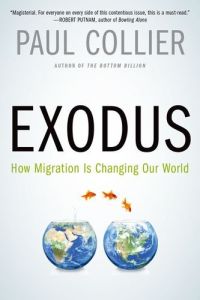Join getAbstract to access the summary!

Join getAbstract to access the summary!
Paul Collier
Exodus
How Migration Is Changing Our World
Oxford UP, 2015
What's inside?
Understand migration: the good, the bad and the ugly.
Recommendation
On the face of it, migration is not complex – poor people move to more prosperous countries, war-torn people flee – but it generates multifaceted effects. Governments struggle to establish policies that are fair to immigrants and indigenous populations. Economics professor Paul Collier, author of The Bottom Billion, considers the economic, social and political ramifications of migration. He examines migration from three standpoints: how it affects migrants, the lands where they relocate and the countries they leave behind. Though he provides an informative, thought-provoking backgrounder on some pressing immigration issues, Collier didn’t experience everything you’ll know when you read this summary, and he’s writing from a slightly academic perspective. Still, getAbstract recommends his insights to anyone trying to get a handle on some of the factors that shape this critically relevant subject.
Summary
About the Author
Economics and public policy professor Paul Collier also wrote The Plundered Planet and The Bottom Billion.




















Comment on this summary